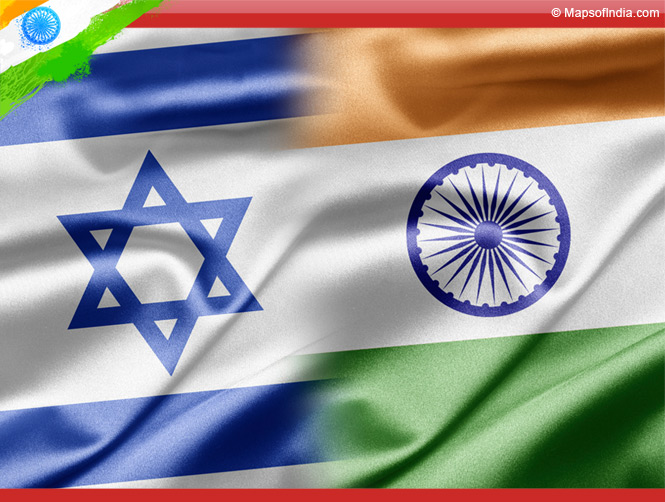
India & Israel as Friends
The ‘Friendship’ between India and Israel:
Strictly speaking, the ‘friendship’ between India and Israel happens to be of a very complex nature. India’s stand towards Israel was officiated in the global political scenario, when India was included in the United Nations Special Committee on Palestine (UNSCOP). India’s vote went against the November 29, 1947 United Nations Partition Resolution. Even India refused to recognize the status of the independent state of Israel when the country came into existence, in 1950. However, the early nineties saw a transformation in the India – Israel relations with room for further improvement.
Some basic areas of India – Israel alliance:
The recent years are witnessing the development of the India – Israel relationships. While India happens to be Israel’s second largest export market, Israel had opened up its high technology sector for India. 2013 witnessed some of the recent Israel – India agreements in a new light in the fields of technology, biotechnology and agriculture, including a free market negotiation in the said fields. 28 agriculture training centers had been set up in 10 states of India, following a three – year agricultural agreement, between the two countries. Several sectors in the technological realm had been demarcated on a priority basis for Indo – Israel ventures, namely Space and Aeronautics, Water Management, Nanotechnology, Biotechnology, Water Technology and Alternative Energy.
Israel happens to be a global authority in the technologies of drip irrigation and desalination techniques. Since 2006, the two countries had been collaborating in a joint research in the said fields. A fund of USD 50 million had been earmarked for a joint venture of the two countries in improving the Dairy Farming and Micro Irrigation Technologies of our country. Another agreement between the two countries had been conceded in 2011, which explicitly focuses on the improvement of the urban water supply system in India.
Israel had also been proactive in participating in a joint water management program to solve the problem of supplying clean, potable and drinkable water to the 1.2 billion strong population of India, a problem that has been beleaguering our country since independence. The researches for the said program had been undertaken by the two countries in great detail, with both sides pitching in the finances and had continued for five years. However, the Indian scientists had been unable to implement the technologies provided by Israel for such purposes, mainly because of the enormous size of the Indian subcontinent.
India also had taken initiatives in launching a 300 pound Israeli Satellite using its own space technologies.
The India – Israel military alliance:
While discussing the India Israel Military alliance, the first issue that comes to mind is the Barak Missile deal. The Barak Missile System was the result of the joint venture of the Israel Aircraft Industries (IAI) and the RAFAEL Armament Industry of Israel. India had penned contracts with Israel on 23rd October, 2000 to purchase seven such missile systems, the budget for which was USD 199.50 million and 200 missiles at a cost of USD 69.13 million.
However, the missile deal later turned out to be the largest defense perpetrated scam during the NDA regime, in which many ex – political leaders were indicted including the ex – Defense Minister Gerorge Fernandes and Jaya Jaitley. CBI was investigating this scam since 2006, for the past seven years, but a few days back the CBI investigations were called off by the Ministry of Defense (MoD). Following this, the MoD and the panel nominated by the Defense Acquisition Council had cleared the Barak Missile deals of any disputes and the Attorney General had given a green light for the purchase and the actual handover of the Barak Missiles, which were thwarted due to the CBI investigations.
It is evident that, the India – Israel military relationships takes precedence over the unraveling of the defense corruptions in our country. So, it was expedient for the MoD to call off the CBI probes in the scam, especially when IAI was one of the chief suspects and the USD 393 million Barak deal was finalized. It is natural that, with so many arms procurement plans from Israel (discussed below) pending as well as joint ventures, India would not favor perturbing one of its chief military allies with CBI investigations.
India happens to provide one of the chief markets for Israel manufactured armaments and is presently on the brink of finalizing a contract regarding the procurement of the Barak anti – tank missile, a product of the RAFAEL Advanced Defense System. Furthermore, India is also mulling over the proposed purchase of the Spike anti – tank missile.
In the meantime DRDO is gearing up for a joint project with Israel in developing a ‘man portable high tech battlefield systems’ for the Indian Army, a project which has an estimated market value of USD 3 million. The Futuristic Infantry Soldier As A Systems Program (F –INSAS), also referred to as the C2 (portable command and control) will be equipped with a computer coded monitoring system, that can observe and keep track of the extreme desert climates in the southern regions of the country to the cold mountainous weather conditions in the LoC between Pakistan and India. C2 happens to be the ambitious project of the Indian Army of conjoining the 1.1 million Indian soldiers stationed throughout the vast subcontinent of India.
Israel Aerospace Industries (IAI), the pilot group of Israel’s armament industries, had already bagged a contract of USD 1.1 billion in 2009 for providing the Indian Navy with the advanced Barak – 8 tactical air defense missiles for the Navy frigates, which the Navy plans to develop into a multi – purpose weapons system, and is in the process of financing the said plan. The closure of the CBI investigations and the clearance of the MoD and the Defense Acquisition Council will make it possible for the all the pending India – Israel arms deals to go through.
Meanwhile, the Indian Navy has been witnessing some heavy refurbishments to countermand China’s increasing naval capacities. The Navy had been proactive in pressing the issue of a clearance of the Barak missile deal with the Defense Ministry, primarily because three warships of the Navy had already been equipped with the Barak Missile Systems which, however, is proving worthless with no missiles to fire. The Navy had also put in a requisition of 300 more Barak missiles to equip the Bramhaputra Class ‘guided missile frigates’ namely the Ranvir, Bramhaputra, Betwa and Bias. The estimated cost of arming these frigates is USD 100 million. Though the Spike deal was declared in cessation in April, 2013 owing to the CBI investigations, has also received the necessary clearance.
With the Indian Army currently short on anti – tank missiles, is now consistently putting up the pressure for a more advanced missile launching system (third generation variant), the next convention of the Defense Acquisition Council is likely to consider the issues at hand including the Army’s demand as well as the Spike and missile deals. The third generation variant of the missile, as requisitioned by the Army, will involve the purchase of 8356 missiles and 321 launchers preferably from Israel.
Conclusion:
Despite its pro – Palestine inclinations India has been very diplomatic in maintaining its relations with Israel. It may seem that, the relationship between the two countries is strictly based on economic interests, chiefly arms deal. But lately, in the light of the changing international politics, the relationship between the two countries had strengthened and it can definitely be said that Israel is on its way of becoming a friend to India. The Barak missile deal is one instance of India extending a hand of friendship towards Israel. There is also the common denominator of terrorism issues that binds the two countries together. What Pakistan is for India today, Palestine translates the same for Israel. Under the circumstances, it is natural for Israel to find an ally and a friend in India who is not directly associated with the conflicting issues facing Israel, given the already existing strong economic and other ties that the country has with India. The ‘friendship’ between the two countries can at best be described as nascent. ‘A friend in need is a friend indeed’ type of a situation is yet to present itself to both the countries. Only under such circumstances it can be safely concluded whether Israel is a true friend of India or not!




